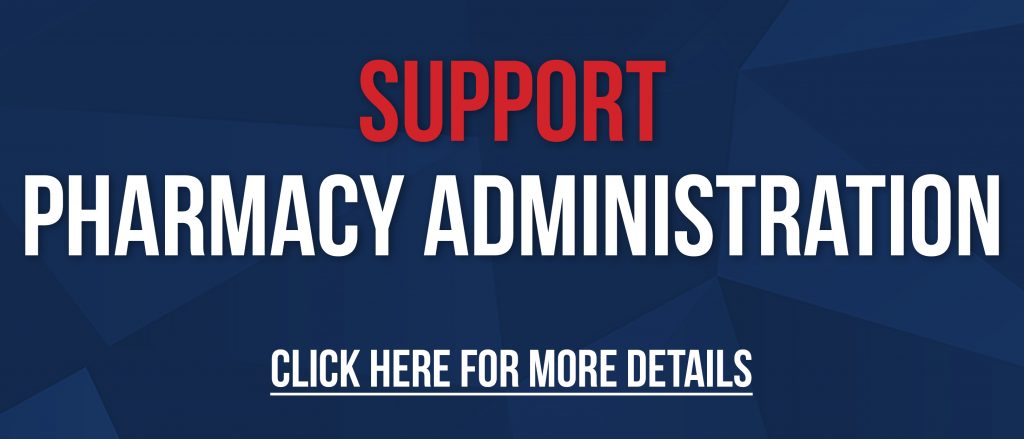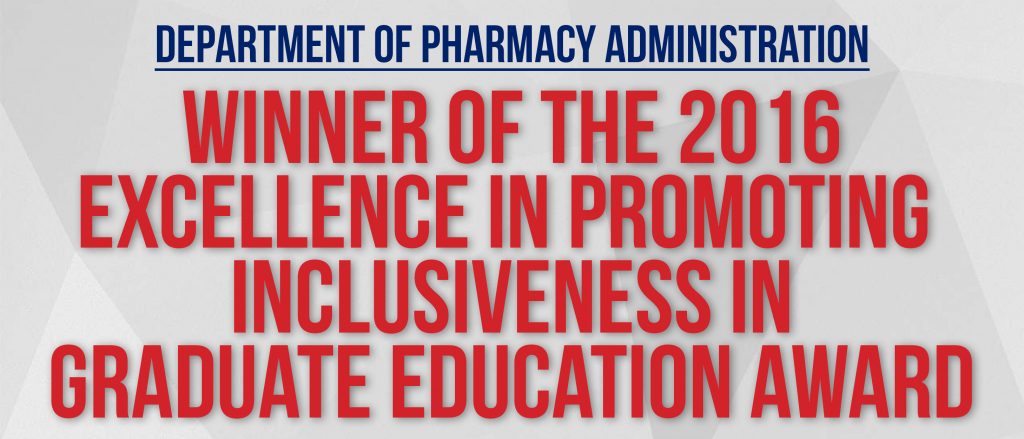Ph.D. Program
Admissions
Admission criteria for the Ph.D. in Pharmaceutical Sciences with emphasis in pharmacy administration and the M.S. in Pharmaceutical Sciences with emphasis in pharmacy administration are the same. When completing the online graduate application, students should select which program to which they are applying.
Applicants must have a B.S. degree in pharmacy, B.S. degree in pharmaceutical sciences or higher. A degree in a discipline related to marketing, management, economics, epidemiology or other health-related field may also be considered for admission upon demonstration of a commitment to pursuing a career in the field of pharmacy or the pharmaceutical industry.
College transcripts with a minimum of a B average (3.0 on a 4.0 scale) are required.
Our program encourages but does not require either the GRE General Test or the GMAT. GRE/GMAT score submission is optional. You are NOT required to submit GRE/GMAT scores, and applications without GRE/GMAT scores will be given full consideration. You may choose to submit scores if you have them, and they will be considered by the admissions committee. Although you do not have to submit a GRE/GMAT score, opting to submit a strong test score (rather than submitting no score) may increase odds of receiving an invitation to interview, all other things being equal. In our current method of evaluating applicants, a relatively strong GRE/GMAT score could be used to offset a relatively lower GPA, but you would not be penalized for a low or unsubmitted GRE/GMAT score.
International applicants also must meet the University of Mississippi Graduate School’s English Language Proficiency Score Requirement.
Two (2) letters of recommendation, an interview, a resume, and a statement of purpose are used to evaluate candidates. Interested students may apply to the Ph.D. program online and may find additional application information from the University of Mississippi Graduate School website.
| Graduate Program Coordinator | Application Deadline |
| Dr. Marie Barnard The University of Mississippi School of Pharmacy PO Box 1848 Faser Hall, Room 234 University, MS 38677-1848 USA |
January 10 |
The application deadline is January 10. Admissions interviews are scheduled for the second week of January and the last week of January. Competitive applications that are completed by December 15th will be considered for interviews in the second week of January
Curriculum Ph.D. – in Pharmaceutical Sciences
Pharmacy Administration
Course Requirements:
The Ph.D. in pharmaceutical sciences with an emphasis in pharmacy administration offers three areas of specialization: management, marketing, outcomes. The course requirements are dictated by the specialization and are described below in separate sections.
Core Courses (30 hours of credit)
- MKTG 769-Theoretical Foundations of Marketing
- PHAD 679-Primary Data Techniques
- PHAD 688-Research Methods in Pharmacy Administration
- PHAD 689-Pharmaceutical and Healthcare Policy
- PHAD 693-Health Economics
- PHAD 687-Secondary Data Techniques
- PHAD 780-General Linear Models
- PHAD 781-Applied Multivariate Analysis
- PHAD 792-Drug Development and Marketing or PHAD 783-Advanced Pharmaceutical Marketing and Patient Behavior
- PSY 703/EDRS 601/or SOC 501-Statistics
Electives (9 credits)
Non-required 600- or 700-level PHAD or non-PHAD courses approved by advisor.
Students interested in academia may select courses in the School of Education, such as Curriculum and Assessment (EDRS 673), College Teaching (EDHE 662), The College and The Student (EDHE 671), or Topics in Higher Education (EDHE 333).
Non-Thesis Research (6 credits)
PHAD 698
Emphasis Area
The Ph.D. in Pharmaceutical Sciences with an emphasis in pharmacy administration offers two areas of specialization: marketing and management or outcomes. Students select one area of specialization and then complete the course requirements as described below.
Marketing and Management Track (choose 12 hours)
- BUS 667-Global Business Strategy
- MGMT 673-Seminar in Human Resources Management
- MGMT 676-Seminar in Organizational Behavior
- MGMT 679-Theoretical Foundations of Management
- MKTG 762-Marketing Management
- MKTG 766-Advanced Studies in Consumer Behavior
- MKTG 768-Marketing Communication Thought
- PHAD 792-Drug Development and Marketing or PHAD 783-Advanced Pharmaceutical Marketing and Patient Behavior
Outcomes Track (12 hours)
- PHAD 794-Pharmacoeconomics
- PHAD 796-Pharmacoepiemiology
- ECON 604-Statistical Methods for Business & Economics (Econometrics) or equivalent course
- PHAD 786-Patient Reported Outcomes
Other Academic Requirements:
In addition to the course requirements, each student must participate and complete an orientation to the discipline of pharmacy administration and register for a departmental seminar (PHAD 543/544) each semester (1 credit hour per semester). Each student must pass a comprehensive examination, prepare and successfully defend a dissertation prospectus, and complete and defend his/her dissertation project, which is based on original, independent research.
If an applicant has a master’s degree, he or she may petition in writing to the department chair for transfer, substitution or waiver of certain courses upon entry into the program. The faculty will evaluate the request, following the Graduate School policies, and determine which courses, if any, can be waived or substituted. If an applicant has completed a thesis, he or she will be asked to provide a copy of the thesis for review to determine whether waiver of non-thesis research or other courses is acceptable. Substitution or waiver of courses will then be documented on the student’s progression form.
Description of Pharmacy Administration Graduate Course Offerings
541 & 542. PROBLEMS IN PHARMACY ADMINISTRATION. Investigation of individual problems.
543 & 544. SEMINAR IN CURRENT HEALTH TOPICS. Pharmacy administration departmental
seminar.
679. PRIMARY DATA TECHNIQUES. An overview of the primary research techniques used in executing research projects related to pharmaceutical marketing and/or pharmacy management. Included are sampling, instrument development, and data collection using several personal interview and self-administered survey techniques. Prerequisite requirements for this course may also be satisfied by consent of instructor. Prerequisite: PHAD 688 with grade of C.
687. SECONDARY DATA TECHNIQUES. Techniques and principles useful in using secondary data to answer research questions, including data and data source evaluation,accessing and preparing secondary databases, and review of common data types and sources.
688. RESEARCH METHODOLOGY AND TECHNIQUES. An introduction to the research process from project inception to its conclusion. Students will be exposed to issues surrounding the establishment of the problem statement, hypothesis generation and testing, measurement, research design, sampling theory, data collection and analysis, and ethical conduct in research.
689. PHARMACEUTICAL AND HEALTHCARE POLICY. The delivery and financing of pharmaceuticals and pharmacy services; development and implications of pharmaceutical and healthcare policies in the public and private sectors at the federal and state levels.
690. DATA MANAGEMENT AND STATISTICAL SOFTWARE. To introduce students to data management and provide a survey of statistical software.
693. HEALTH ECONOMICS. The financing and delivery of health care in the U.S., including economics of health care, economics of the U.S. health care system, and current policy issues including health care expenditures, health care reform, and economics of the uninsured.
697. THESIS.
698. NON THESIS RESEARCH I AND II.
780. GENERAL LINEAR MODELS. An intermediate-level course in regression analysis methods covering the basic theory and application of the general linear model (GLM) to conduct relevant analyses. Simple and multiple linear regression are extensively covered as well as a number of procedures falling under the general category of analysis of variance (ANOVA). Prerequisite(s): An introductory statistics course at the graduate-level, which covered topics such as: descriptive statistics, applications of basic probability theory, commonly used sampling distributions, hypothesis testing, analysis of two-way contingency tables, one and two sample tests, confidence intervals, correlation and simple linear regression, and introduction to one-way analysis of variance.
781. APPLIED MULTIVARIATE ANALYSIS. An intermediate-level course examining techniques generally considered to be multivariate in nature or having a multivariate approach to analyzing data (e.g., multivariate analysis of variance, repeated-measures analysis of variance, discriminant analysis, logistic regression, cluster analysis, and factor analysis). Prerequisite(s): PHAD 780 (minimum grade: C) or consent of the instructor.
783. ADVANCED PHARMACEUTICAL MARKETING AND PATIENT BEHAVIOR. Doctoral seminar exploring the factors affecting acceptance, distribution, promotion, and economics of pharmaceutical marketing and the theoretical perspectives in understanding behavior in the medication use process. Prerequisite requirements for this course may be satisfied by equivalent course work as approved by the department or by consent of instructor.
786. PATIENT REPORTED OUTCOMES. The overall objective of this course is to familiarize students with the understanding and application of PRO’s in health services and outcomes research. The course will involve discussion on PRO topics including quality of life and health-related quality of life, generic and disease-specific PRO instruments, health state preferences (values and utilities), patient satisfaction, measurement issues (including applications of classical test theory, item response theory, Rasch analysis), and adherence to therapy.
792. DRUG DEVELOPMENT AND MARKETING. Provide participants with insight into the administrative procedures involved in the developing and marketing of new pharmaceuticals, from discovery through market approval, including both industrial and policy perspectives.
794. PHARMACOECONOMICS. Principles and analytical techniques in assessing the overall value of pharmaceutical products, services, programs and other health care interventions, including hands-on experience of pharmacoeconomic modeling.
795. SPECIAL TOPICS IN PHARMACY ADMINISTRATION. Course designed to cover special topics in pharmacy administration or health care administration in general that are not covered in regular courses and may be suitable for M.S. or Ph.D. students in pharmacy administration or other related disciplines. Examples of recent special topics include: Categorical Data Analysis, Markov Simulation Modeling of Health-Related Events, Longitudinal Data Analysis Methods, and Principles of Statistical Mediation and Moderation.
796. PHARMACOEPIDEMIOLOGY. This graduate-level course in designed to familiarize students in pharmacy or other health care fields with the principles of pharmacoepidemiology. Course provides a comprehensive review of research study designs used in the science of pharmacoepidemiology and involves a discussion of primary literature that details case examples of drugs withdrawn from the United States (U.S.) market due to adverse events.
797. DISSERTATION.
Note this is only a list of graduate courses offered by the Department of Pharmacy Administration. Graduate students have the opportunity to take courses across campus including in the School of Business and in the School of Applied Sciences.


